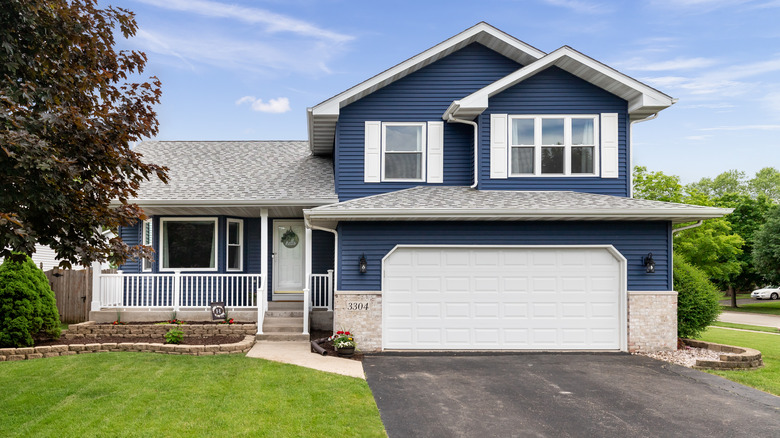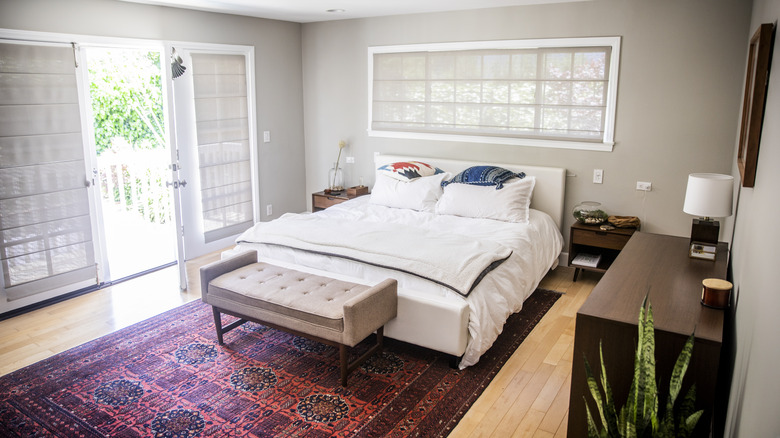The Popular Housing Term Our Favorite HGTV Shows Stopped Using & Why
If you've previously spent time perusing real estate listings online, touring houses, or watching hours of interior design content on television, you've probably grown accustomed to hearing the term "master bedroom". The master has traditionally served as the largest and most conveniently placed bedroom in the entire house. This room is also often designed as an en suite, meaning the designated bathroom is connected to the bedroom for easy access and privacy. HGTV is just one entity that no longer uses the term "master bedroom" due to the phrase's speculated connection to slavery, on top of budding accusations of carrying racist and sexist undertones.
While many institutions have vocalized the controversy that has shrouded the home feature's popular name, this represents a change that's far from permanent or industry-wide. Real estate agents, architects, designers, and contractors alike have long used the phrase to describe the central sleeping quarters for a house or apartment, and it's likely that many won't stop using it anytime soon. However, regardless of how it's referred to, the spaces are still coveted inside houses today, as they offer many desirable amenities to homeowners, like walk-in closets, seating space, and private, lockable entrances. But there's more to consider about the alleged insensitivity surrounding the term "master suite" and its components, as well as the more inclusive terminology that agents and other parties in the industry have adopted instead.
Master suites allude to societal imbalance and slavery
Master bedroom, master bathroom, master suite — each of these terms has dominated the real estate scene over the past several decades, only growing more popular since its coining in the early 20th century, with the words "master bedroom" first appearing inside the 1926 edition of Sears' annual catalog. However, the rise of conversations about inclusivity and racial justice in 2020, predominantly sparked by the revival of the Black Lives Matter movement, placed these often-used descriptors at the center of controversy, leading some individuals and businesses in the real estate world to drop them from their professional lexicons altogether.
The television network HGTV is just one of the companies that followed suit, with the network choosing to eliminate the phrase from its myriad of broadcasted programs in exchange for more inclusive terminology. Other institutions in the industry began making the switch to more inclusive language in 2020, including the Houston Association of Realtors, the National Association of Home Builders, and construction company Lennar Corporation.
Critics accused the word "master" of alluding to the United States' long history of slavery, in which slave "masters" resided in sometimes opulent quarters within their massive plantation complexes. However, defenders of the terminology, like the National Association of Realtors, opted against replacing the phrase "master bedroom," stating that no connection to slavery or any other form of discrimination can be confirmed through its modern-day usage.
Alternative phrases used instead
As the terms "master bedroom", "master bathroom", and "master suite" have started seeing less engagement over the past few years, other classifying phrases have been selected to take their place, particularly among real estate agencies. Browsing the descriptions of property listings like those found on Zillow, Redfin, or Trulia, you may find the phrases "primary bedroom", "primary bathroom", or "primary suite" scattered throughout the text, terms still referring to the largest bedroom-bathroom combination inside of a home. Realtors and designers might also call these spaces the "main" bedroom, bathroom, and suite. HGTV's television hosts reportedly use both of these terms in place of "master" in their current programming.
Some builders, on the other hand, switched to calling master suites "owners' suites" many years prior, likely referencing the rooms' history as spaces designed to accommodate the head of a family or household. Legislation of the past made it challenging for women and people of color to buy a home or property, and as such, heads of house, especially from a perspective of homeownership, were traditionally male and white. But, with amendments to these laws causing the racial and gender identities of homeowners to become more diverse over time, the term "owners' suite" may prove to be much more inclusive and representative of the current and ever-changing demographic of residents and home buyers in the country.


